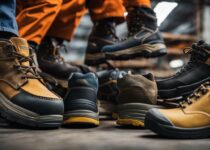The Shoe Story — Do Shoes Help Babies Walk?
We all were babies once, and our parents were concerned about whether shoes help babies walk?. Babies can’t walk until they’re six months old. But why? Because a baby has a narrow, misshapen little foot with too much or too little muscle mass, making it is hard for them to use the muscles needed to push off and take their first steps. So the
The answer is yes. to our question, Do shoes help babies walk?
Babies that wear their shoes on their feet learn to walk sooner than those who don’t. It’s called the “foot-in-shoe” effect and it’s been around for decades.
A recent study was conducted at the University of Texas Medical Branch in Galveston, TX. The study investigated the effects of wearing footwear on the gait and posture of babies, and discovered that babies who wore shoes in the first 3-6 months of their lives tended to stand straighter and move their legs more freely than those who didn’t wear any footwear. In other words, wearing shoes makes babies better at walking, but they weren’t able to do so without them.
1. The science behind baby walking
In the first few weeks of life, babies are capable of holding their own heads up. But, by four to six months, they’re capable of learning how to walk on their own. The key to baby walking is for the infant to understand that by putting weight on the foot, it’s going to move forward. It is at this point, a baby is capable of “walking” on its own.
If you’ve ever watched your infant try to walk, you know that she or he may stumble a few times before finally mastering the art of balancing and taking steps. This is because babies have an immature nervous system, which means they’re not yet able to regulate muscle tone. In other words, their muscles don’t know how to get tight or loose. This is why it’s important for you to help your baby learn to balance.
2. What happens during the first week of life
The first few weeks of life are extremely important and formative for babies. If you want your kids to grow up happy, healthy, and successful, this is the time to get involved. You can help set the stage for healthy eating habits, positive communication skills, and a sense of social responsibility. The first few months of life are a critical period of brain development and learning. As parents, it’s our responsibility to make sure we’re doing everything we can to ensure a healthy start for our children.
3. How the foot develops during the first year of life
In the first year of life, the foot develops from a tiny bud at the base of the leg. The first two years are critical for the growth of the foot. At birth, the arch is a “C” shape, and it should remain in this shape. As the baby grows, the arch becomes progressively flatter. By age three, the arch is usually flat, and by age five, the arch has reached a state of collapse.
4. How to teach babies to walk
If you’re expecting, here’s what’s going to happen. As soon as the baby’s first kicks appear, you can start moving your arms. The baby will likely start to kick with his or her legs too. In just a few months, your baby will start crawling, then walk. Here are a few ways to help your little one get started: • Keep things fun. Don’t worry if your baby gets a little wobbly when he or she starts walking. A good balance will develop in time. • Give your baby plenty of opportunities to practice. Walk him or her over to the table or counter while talking to her or him. • Offer plenty of encouragement. Your baby might feel anxious or scared of falling, so offer lots of praise and smiles. • Remember that babies need to learn on their own time. Don’t rush them along.
5. How to select baby shoes
Baby shoes can be tough to pick out when you’re looking through a lot of different options. What do you look for when selecting baby shoes? The first thing to consider is the type of shoes you want, whether they’re flats or heels, and the color. Do you want a solid color or do you want your shoes to match a certain outfit? Next, what style of shoes are you looking for? You want something that will fit your child’s feet properly, but also that will look cute on them. If your little one is going to be walking or running around a lot, look for shoes with a durable sole and slip-resistant materials.
Conclusion
In conclusion, you need to use the right kind of footwear to get the results you’re looking for. In most cases, the wrong choice of footwear can result in a child being injured or having a problem walking properly. The right type of shoe will not only help your baby get used to walking properly, it will also help them develop better balance, coordination, and muscle strength. For more information on this topic, read How to Make Your Baby Walk in the Right Direction.
FAQ
Is it OK for babies to wear shoes?
Unless your baby is walking, shoes are totally unnecessary. Why put them on now? You won’t need them. However, if your baby starts walking, then buy good soft shoes for him or her so that walking is safe.
What age do babies need walking shoes?
though babies start walking after 6 months, However, you can provide shoes to your baby before that for comfort and a good look. You can decide when your baby need a shoe, keeping in view the surface on which the baby normally walk.
Why should babies wear walking shoes?
There are lots of reasons why babies should wear walking shoes but one of the most obvious is safety. Many parents worry about their baby getting injured on the playground or slipping while walking around inside a house. This could result in a trip to the emergency room, where the baby’s condition can be evaluated. When walking shoes are used, this is less likely to happen.
Should a toddler wear shoes when learning to walk?
I think the most important piece of advice for parents is to trust your child’s instincts, but also don’t force him or her to wear shoes until he or she is ready. If you’re not sure, try putting a pair of shoes on his or her feet first, and see if he or she seems to like them. If he or she wants to wear them, don’t force them to take them off. A lot of times, kids just want to see what they can do, and once they realize they can do it, they’ll usually keep doing it.
How can you help baby to stand without support?
So, let’s say that the baby has been born and you want to know how to help your new little one to stand up on its own. if you want the baby to stand on its own, you have to make sure it has a firm base to stand on. The easiest way to do this is by using a high chair. You can also use a walker or a tripod to make sure the baby has a firm base to stand on. It will also be easier if you put baby on a changing table rather than in a crib or a bed. The key is to keep your baby safe and prevent any possible accidents that may happen in the future.
Do new walkers need shoes?
One of the first skills babies learn when they start walking is to balance. If you ask someone who is a parent of a child who is able to walk unassisted, they’ll tell you that it’s important for them to be wearing shoes when they start walking—otherwise, they could trip over and fall down. But if you ask a pediatrician, he’ll tell you that babies don’t need shoes when they start walking—they can learn to walk without them. The answer to this question comes from a study done by Stanford University in California. The study involved a group of 5-month old babies who were placed on a mat with no toys to play with. The researchers then measured the distance that the babies could move their legs before falling off of the mat. At 5 months, the average baby could move his or her legs about 2 feet. When the researchers removed the baby’s shoes, they found that this distance increased to about 3 feet, proving that babies do indeed learn to walk without shoes.
Why do babies walk late?
Because babies don’t walk early. There is an old saying that goes like this: If you want to learn how to walk, start when babies do. Babies don’t walk very early on because they need to develop the coordination and muscle control required to walk on their own. If you’re in a rush to get to school, walking late isn’t an issue. You won’t get a penalty from the bus. But if you’re going somewhere that’s far away, and you don’t want to miss it, you should probably be walking earlier.


